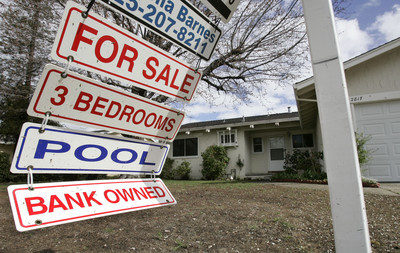House passes bill letting judges alter mortgages
WASHINGTON -- The House last week passed a housing aid bill that would allow bankruptcy judges to adjust the mortgages of financially stressed homeowners.
Lawmakers voted 234-191 for the bill, which contained other housing aid initiatives. It revamped the Hope for Homeowners program that was enacted last summer but isn't helping significant numbers of troubled borrowers.
But the most contentious part was a so-called "cram-down" provision that would allow judges to lengthen loan terms, reduce interest rates and cut principal owed on homes belonging to bankruptcy filers.
Supporters said bankruptcy judges already have the authority to modify mortgage terms on farms, vacation homes and rental properties, but not homes occupied by owners. It was estimated the bill could help 1 million homeowners.
Critics said it will lead to a flood of bankruptcy filings, and that judges inexperienced in real estate could cause turmoil. They predicted banks would respond by raising interest rates to compensate.
Reps. Shelley Berkley and Dina Titus, both D-Nev., voted for the bill. Rep. Dean Heller, R-Nev., voted against it.
The bill was sent to the Senate, where it will face a much tougher road amid the same industry opposition and reservations from moderate Democrats that nearly derailed it in the House.
SENATE DEBATES EARMARKS
Senate Democratic leaders last week worked toward passage of a $410 billion appropriations bill, but Republicans sought to call attention to its size and the number of earmarked projects it contained.
The bill would fund dozens of federal departments through September, which is the end of fiscal 2009. Democrats had put it aside late last year after hitting an impasse with President George W. Bush, and are attempting to finalize it with a presumably friendlier President Barack Obama in the White House.
But the bill sparked new debate over the role of Congress in directing how money should be spent from appropriations bills.
Critics of earmarks call it questionable spending that often is directed to pet projects of lawmakers and local interests. But others say lawmakers have the authority and the responsibility to make judgments on how federal money is spent.
Republicans challenged Obama to veto the bill, or to condemn the earmarks since he campaigned against "wasteful" spending.
Taxpayers for Common Sense said it found 8,570 disclosed earmarks totaling $7.7 billion in the bill.
Sen. John McCain, R-Ariz., proposed to roll the 2009 spending bill back to 2008 levels, a savings of $22 billion, and delete the earmarks. His amendment was defeated 32-63.
Sen. John Ensign, R-Nev., voted for the amendment. Sen. Harry Reid, D-Nev., voted against it.
Sen. Tom Coburn, R-Okla., tried to strip out earmarks destined for clients of The PMA Group, a lobbying firm whose campaign contributions are being investigated by the FBI. He estimated there were 13 earmarks costing more than $10 million.
Coburn said senators who would vote to earmark money arranged by a lobby firm under federal investigation have some explaining to do.
Coburn's amendment was killed, 43-52. Ensign voted for it while Reid voted against it.
Contact Stephens Washington Bureau Chief Steve Tetreault at stetreault @stephensmedia.com or 202-783-1760.






















